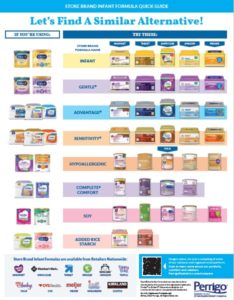If your baby drinks formula, I have no doubt you are experiencing the difficulties of the nationwide formula shortage over the past few months. As a pediatrician, it has been heart-wrenching to see the lengths to which parents have had to go to get such a basic necessity for their baby. From driving long hours, to searching store after store, to swapping with other moms, to contacting manufacturers, I can only imagine the stress that this situation has added to an already difficult time.
While the federal government is making moves to relieve the shortage and formula manufacturers are working to ramp up production, that will take time. Meanwhile, there have been many helpful — and some not-so-helpful — tips and recommendations circulating among parents. I want to help lay out some advice on what you can do, and what you should avoid, in helping your baby stay fed during this time.
Do:
- Check smaller stores and drug stores, as well as warehouse clubs like Costco and Sam’s Club, as they may have more supply than the typical department stores like Target or Walmart.
- Switch to a comparable formula if you cannot find the specific brand/type that your baby uses. For most formulas, generic store brands are available and are identically regulated by the FDA for safety and nutrition. Here is a chart that shows alternatives to Similac and Enfamil formulas.
- Team up with other parents through community groups, social media groups (such as Boulder Babies, Boulder Area Moms, Longmont Moms Network, and Avista’s Moms, Babies & Kids on Facebook), or childcare centers to identify local areas with available supplies.
Don’t:
- Do not water down formula. Babies need a certain concentration of calories, electrolytes, vitamins, and minerals. Any dilution would risk serious medical problems for your baby.
- Do not mix your own formula. Homemade recipes are not tested or verified to have the appropriate amount and form of vitamins and minerals, including iron, calcium, and salt.
- Do not use unregulated, imported formula. Some imported formula is not tested and regulated by the FDA, and the transportation and storage of imported formula can negatively impact safety and nutritional value.
- Do not hoard. We are all in this together, and while it is appropriate to have enough formula on hand for a short time, purchasing excessive amounts will just prolong the problem for all babies.
For the Short Term:
- For babies over 9 months old, and who do not have special nutritional needs or intolerances, it is an option to give toddler formula, whole cow’s milk, or protein- and calcium-fortified soy milk for a few days in an emergency. Oat milks and nut milks are nutritionally insufficient to use as a substitute, and should not be used.
- You can always meet with your pediatrician if you are experiencing significant difficulties. Your pediatrician may have small amounts of samples and/or contacts with formula manufacturers, for those who are at risk of truly going without.
Additional Resources
- FDA Takes Important Steps to Improve Supply of Infant Specialty Formula Products
- Alternatives to Similac and Enfamil formulas
- Healthychildren.org – Is Homemade Baby Formula Safe?
 About Allen Ruan, MD
About Allen Ruan, MD
Pediatrics at Boulder Medical Center
As a board-certified pediatrician, Dr. Allen Ruan provides the full range of care, including:
- Newborn and Well-Child Preventive Care
- Acute Sick Visits
- Chronic Medical Conditions such as Asthma
- Dermatologic Conditions such as Acne and Warts
- Mental Health, Including Depression, Anxiety and ADHD


